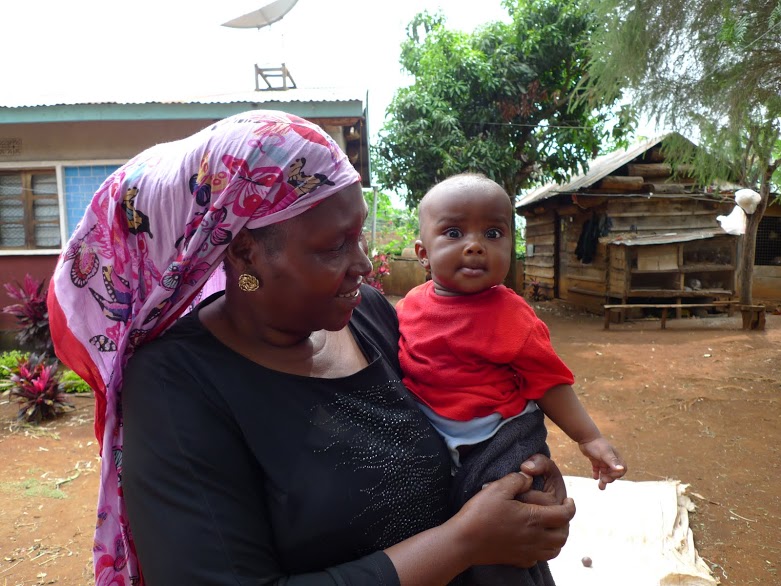
Loyce's Story
Loyce's Story
What led you to set up Envirocare?
I am a Tanzanian, from a country rich in land, minerals and tourism attractions, with peace-loving people and a stable political system. The sad part is that 56% of our people go hungry and 38% of them live below poverty level. Seeing the contradictions between the potential and the poverty, I asked myself how I could make a difference. This is what gave me the inspiration to start a local NGO – Envirocare – to conserve the environment while improving livelihoods in local communities. I wanted to change people’s attitude towards poverty and to create a centre of excellence in working for a clean and safe environment that can benefit all citizens equally and in a sustainable way.
What is the most memorable project you’ve been involved with?
Of all the projects implemented by Envirocare, the one that most touched our spirits and hearts was the children’s project in Kilimanjaro. The project was set up to deal with the agony of sexually abused girls whose suffering was going on unreported. They were vulnerable and voiceless, and to top it all they could not see where to turn to because of the strong traditional and cultural practices around them. Envirocare was able to mobilise the community to reject violence and abusive behaviour and in turn empower children and women to stand up for their rights. A test case was written and produced in the form of a storybook for children which has been used for awareness-raising in schools. This has played a great role in bringing to light cases of abuse which were previously not reported. The girl at the centre of the test case was supported and followed up by Envirocare; she completed college and is now a primary school teacher.
While implementing that project, we came across another devastating issue. Children were going without food from 6:30 am to 4:00 pm when they returned home from school a distance away. Following up on their educational performance, we found it was very low and discouraging compared to their counterparts in other districts. Realising that the children were starving, Envirocare introduced school gardens in twelve primary schools in Rombo district and ten in Siha district where children were given a healthy meal and were able to perform better. The project targeted 300 children but ended up serving more than 500. Not only did we address the immediate need for healthy food; the harvest was enough to create an excess that was sold for income.
What drives your work?
Envirocare’s work touches the cross-cutting issues of poverty, gender and environment. This has given me the opportunity to be in touch with people in need, especially children and women. For them it is vital to address both environmental degradation and wealth creation to tackle poverty. From the beginning of my work, I wanted people to understand the potential and blessing of the natural resources we have in Tanzania. I also wanted my fellow citizens to appreciate, respect and care for the environment while engaging in developmental activities to protect and conserve it for present and future generations.
This is why I have started projects that help people, children and women to start their own income generation projects that are environmentally friendly. For example, we targeted families caring for more than 400 orphans and vulnerable children in Iringa and Mara region with projects including tailoring, chalk-making, carpentry, welding, food processing, tie-dye and farming. The projects have empowered them economically as well as socially.
I have helped primary school teachers and pupils to start growing nutritious food crops in their school gardens in order to get a healthy diet in school without compromising their studies. In the process pupils are being nurtured to learn how to produce healthy food and care for the environment even as young farmers. As it is said,” teach your children while they are still young and they will never forget”. These will be future responsible farmers who will produce sustainably.
How do you see the future for Tanzania?
The majority of the population live in the rural areas where infrastructure is not favourable. In the course of implementing project activities our biggest challenge is to address the level of ignorance. Inadequate knowledge, skills and technologies in the local communities have been a drawback to improving rural livelihoods. People have not been able to utilise their surrounding environment to solve their daily problems despite plenty of natural resources. The world economic crisis is a silent challenge which has also had a big impact on the local economy. Inflation has increased prices of commodities meaning that the marginalised groups, especially women and children, are the most affected.
We are committed to helping people build on the resources readily available in order to bring about positive changes. We extend our gratitude to our trustees, staff, development partners, local communities and all those who are contributing towards reaching the needy and achieving that vision.
Some names and identifying details have been changed to protect the privacy of individuals. Often, photos are purely illustrative and do not represent the individuals portrayed.